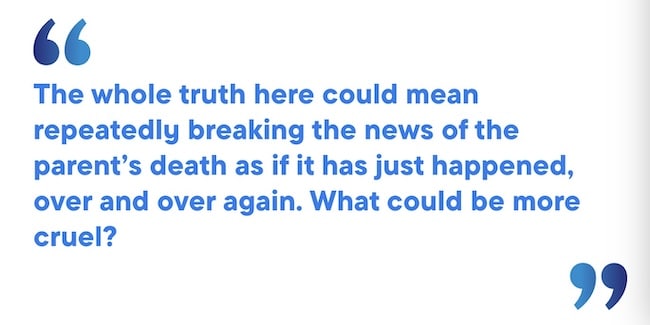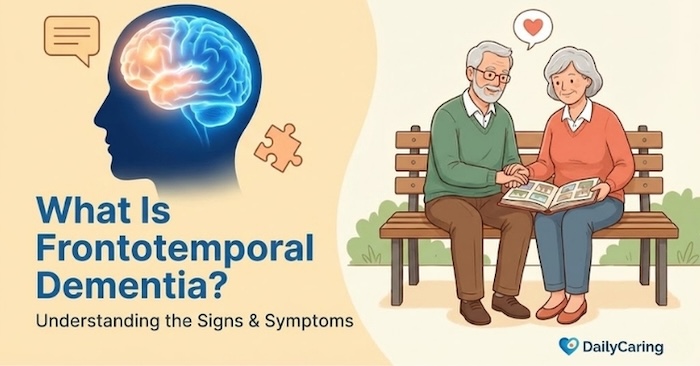When caring for someone with dementia, honesty isn’t always the best policy. Experts often recommend therapeutic fibbing—a compassionate approach where caregivers gently bend the truth to reduce distress, avoid agitation, and meet emotional needs.
Rather than correcting or confronting a loved one with dementia, therapeutic fibbing allows caregivers to enter their reality, offering comfort and reassurance. In this article, we’ll explore why this technique works, when to use it, and how it can improve the quality of life for both individuals with dementia and their caregivers.

“Always tell the truth” is one of the golden rules we're supposed to adhere to. But when it comes to dementia, telling the truth can be cruel and unnecessary at times. Let's explore why that is and why “therapeutic fibbing” can be both compassionate and appropriate.
Stepping Into Someone’s Reality Isn’t the Same as Lying
Honesty isn't always the best policy when it comes to someone with Alzheimer’s disease or dementia.
That’s because their brain may experience a different version of reality.
Dementia damages the brain and causes a progressive decline in the ability to understand and process information.
That’s why forcing someone to abandon their version of reality and join our “real world” can cause confusion, pain, anxiety, fear, and anger.
So, dementia care experts often recommend a technique called therapeutic fibbing. It helps you step into their current reality and spare them unnecessary upset and distress.
This technique takes some time because following your older adult’s new reality can feel like lying to them.
But using white lies to validate their feelings and reassure them is certainly not the same as lying for a malicious reason.
We explain why always telling the truth could be cruel, how therapeutic fibbing helps you join their reality, and share two real-life examples of how to use therapeutic fibs to provide comfort and reassurance.
VIDEO: Sometimes Lying to Someone with Dementia is OK
Telling the Truth Could Be Cruel
Most of us are taught from a young age that lying is horrible and dishonest, especially to family and anyone we care about and respect.
So, when we hear about using therapeutic fibbing to lie to someone with dementia, it might seem cruel and wrong at first.
But always sticking to the truth, especially when it comes to an emotional subject or something trivial, is more likely to cause your older adult pain, confusion, and distress.
That happens because dementia impairs people's ability to process and retain information.
Plus, having short-term memory issues means they’ll probably forget the conversation soon.
Telling the truth each time forces them to experience fresh distress over and over again.
Is it necessary to cause them so much distress, especially when the truth you tell them will likely be misunderstood or quickly forgotten?
Tim Beanland and Angelo Makri from the Alzheimer's Society have an excellent resource that addresses this complex issue. In their piece titled “Is it okay to lie to someone with dementia?”, they discuss one of the examples where it may be upsetting to tell the truth repeatedly:
“It feels uncontroversial that we would all want our default response setting to be telling the whole truth. But it is equally obvious that the whole truth can sometimes be brutal, causing pain or discomfort. Who would support telling the whole truth when a person repeatedly asks after a long-dead parent as if the parent were still alive?”

Therapeutic Fibbing Helps You Step Into Their Reality
An effective way to step into your older adult’s reality is to use therapeutic fibbing.
It means agreeing or saying things that are not true to avoid causing someone distress and to make them feel safe and comforted.
In many ways, this technique is similar to telling a friend that you love the thoughtful gift they gave you, even if you don’t like it. Telling the absolute truth doesn’t change the situation and would only hurt your friend’s feelings.
Here are two examples illustrating the difference between being truthful and using therapeutic fibbing.
While your specific situations will be different, the same principles of gently going along with their reality and finding a distraction will apply.

Therapeutic Fibbing – Role Play Examples
Example 1. Being Completely Truthful
Mom: School is over. My mommy is coming to pick me up now. I need to go outside to wait for her!
You: You’re 89 years old. You haven’t been to school in decades. And don’t you remember that your mom died 25 years ago? You don’t need to go outside because she’s not coming to pick you up.
Mom: What? What do you mean, my mom is dead? No! She can’t be dead!! I saw her this morning! She told me she would pick me up!!! I need to go outside to wait!! (She’s crying, agitated, and screaming.)
Example 1. Using Therapeutic Fibbing
Mom: School is over. My mommy is coming to pick me up now. I need to go outside to wait for her!
You: Oh yes, it’s almost time to go. Your mom asked me to give you a snack first so you won’t get hungry on the way home. Let’s have some juice and crackers while we wait.
Mom: Ok, I’ll have a snack.
You: Use this distraction as an opportunity to occupy her with the snack and a fun activity until she lets go of or forgets about the idea of her mother picking her up.
Example 2. Being Completely Truthful
Your spouse: I need to go to work now. I’m already late.
You: What do you mean? You don’t have a job. You retired 20 years ago. And remember, you have Alzheimer’s now. Stop trying to go out.
Your spouse: Why would you say that!? You’re lying and trying to keep me prisoner! Why are you trying to stop me? I’m leaving. Get out of my way! (They’re angry, agitated, and banging things around.)
Example 2. Using Therapeutic Fibbing
Your spouse: I need to go to work now. I’m already late.
You (suggestion 1): That’s right, I almost forgot. Well, we can’t have you going off without a good breakfast. Don’t worry; you have plenty of time, and I forgot to change the clock after the time change.
Give them a meal if it’s the right timing, or a snack/beverage if it’s not. While they eat, have a pleasant chat about a topic they enjoy to distract them from the idea of going to work. Or, when they’re distracted enough from eating, talk about an enjoyable activity you’ll do together when they finish eating to set up the next transition.
You (suggestion 2): That’s right, I almost forgot. Let’s get your jacket. It’s chilly today, so make sure to pack your lunch. Here, I’ll help.
Gently lead them to get their jacket and find a pleasant distraction: look out the window and start talking about the birds; stop in front of a partially completed fun activity, like a puzzle; stop for a drink of water, etc. When they’re engaged in something else and become distracted, they’re likely to let go of the idea of going to work.
Final Thoughts About Therapeutic Fibbing
Ultimately, therapeutic fibbing isn't about deception; it's about compassion. It's a conscious choice to step into your loved one's reality to provide comfort, rather than insisting they navigate a world that no longer makes sense to them.
The goal shifts from factual correctness to emotional connection. By prioritizing their feelings over the literal truth, you are not being dishonest; you are being a source of peace and stability in a confusing world.
Permit yourself to use this tool. Your kindness in that moment is the truest thing there is.
Recommended for you:
- 8 Ways to Deal with False Dementia Accusations
- 3 Ways to Respond When Someone with Alzheimer’s Says I Want to Go Home
- How to Talk to Someone with Alzheimer’s: Use Short, Direct Sentences
About the Author

Connie is the founder of DailyCaring.com and was a hands-on caregiver for her grandmother for 20 years. (Grandma made it to 101 years old!) She knows how challenging, overwhelming, and all-consuming caring for an older adult can be. She also understands the importance of support, especially in the form of practical solutions, valuable resources, and self-care tips.














I believe it is helpful to do therapeutic fibbing. Having whatever compassion for the sufferer trumps over the actual truth. Though it may be difficult to do for some people when they were raised into being honest and true.
When my Alzheimer’s-ridden mom would storm out of the house, sometimes when a storm was approaching, I’d follow her outside and tell her that a friend of hers was going to call in a few minutes. I’d say that this “friend” had called me on my cell phone to relay this information, and that was enough incentive for my mom to come back inside. Of course, a few minutes later, my mom forgot all about the expected phone call.
That’s an excellent tip, thank you for sharing!
I have been a LPN in long-term care for over 30 years. While the term ‘therapeutic lying’ is new to me, it’s something that’s come naturally to me when dealing with dementia patients since day one. My grandmother had Alzheimer’s before nursing school, & I realized then after watching my grandfather interact with her that any attempts to orient her to reality just upset her more. One of the most frequent things I’ve dealt with in long-term care are patients searching for their spouses, who frequently have been dead for years, or their small children who are now grown. Telling a dementia patient their spouse died years ago serves no positive purpose; it only sends them into the throes of grief and confusion–“why wasn’t I told! I missed the funeral!” When I was a new nurse, Alzheimer’s units, now common and called Memory Care units, were just beginning to pop up. Most dementia patients were on intermediate care units along with patients who were alert and oriented. Most nurses and CNAs intuitively knew it was best for all involved to go along and re-direct these folks. A couple of CNAs early in my career were fired for repeatedly and needlessly upsetting dementia patients by telling them their spouse was dead. The facility cited psychological abuse. Now my dad is a different story. Being precise is part of his makeup. My mom had Alzheimer’s and died in 2015. I was temporarily staying with my parents, caring for my mom when she got to need more care than my dad could provide. One evening she was terribly worried about my brother…where was he? Was he okay? What was he doing? I was reassuring her that he was just fine and at his house, when my dad chimed in: “Well, it’s not really his house, it’s Scott’s,” (My brother was living with our cousin, Scott at the time), then “Well, it’s not really Scott’s, it’s the landlord’s, maybe not even the landlord’s, probably owned by the bank, or the mortgage company”. I had to explain to my dad that he was exasperating to me, let alone how he was upsetting my mom, that when people refer to home or their house they’re referring to the place they live, not a space they own. Aaargh! What came to me intuitively he had to learn. Attending Alzheimer support group meetings helped tremendously. All three of us went together. Meetings were at our local Council on Aging, who also provided adult day care so family members who were primary care providers could attend. Even after over 20 years of dementia care experience I learned a lot. There’s always more to learn. Sometimes it’s very difficult to go along with their altered reality. When my grandmother got to the point she had to go to long-term care, she was convinced that when my grandfather left in the evening he was out having an affair instead of going home. This was before cell phones & there was only a phone at the end of the hall for residents to use, and it was right outside her room. They had to remove the phone & in that case we had to repeatedly tell her he wasn’t having an affair. And sometimes it can be hurtful to grown children when a parent with dementia gets upset and tells them that they’re NOT their children, their children are young. It’s difficult for them to go along, but it can cause less distress if they’re told that their children are safe and being cared for by a trusted friend or family member. I once had a patient who was one of a kind. She was always nicely dressed, complete with jewelry and makeup. Visitors were known to hold the front door open for her in her wheelchair, thinking she was a visitor, too. One day she approached the nurse’s station & said “Excuse me, my husband and I are staying in this hotel for the night, we’re taking the train from Cincinnati to Chicago, & we need a room”. I started to tell her we had a nice room available when my CNA broke in and said “NO! YOUR HUSBAND DIED 15 YEARS AGO!” She said she refused to lie. The lady with dementia took off down the hall, crying and shrieking “Nobody told me! I missed the funeral!”. She was agitated all night. For no reason. The compassionate thing to would have been to go along, take her to her room, and put her to bed, telling her that her husband was fine & would be later. Soothing and comforting, lessening agitation and mental anguish are a big part of caring for people with dementia. This is not the kind of lying we were all taught was wrong. What you were taught as a young child shouldn’t be a source of emotional distress and the re-living of grief, over and over in an emotionally vulnerable person. It’s knowingly inflicting emotional pain upon another. It’s emotional abuse. A few days later, the lady who wanted a hotel room approached me again. This time she said “Ah, yes, sorry to bother you, but my husband and I read an article in the newspaper this morning, and we decided we would like to try a male doctor this evening”. My CNA that day was Preston, a middle aged black man who had been laid off from a high paying, union factory job and was putting his two daughters through college. He was an awesome CNA. I just smiled and told her I had just the man for her and her husband. She was happy and Preston put her to bed easily, telling her that her husband was playing cards (he knew the husband used to play cards) and would be in later. When she fell asleep, she fell asleep happy, all was right in her world. Isn’t compassionate care what we all want for our loved ones? This can’t be compared to lying to a loved one WITHOUT dementia just to keep them happy. It’s not the same as lying to your spouse, saying you’re not having an affair when you are, just to keep them from being hurt. Or lying to anyone on serious issues just to spare their feelings. And I don’t mean telling Aunt Flo her birthday gift was awful, or your Al his his new toupee looks ridiculous! Therapeutic Lying isn’t new, the term is new. Caregivers know, happy, calm, and peaceful is the goal. People with dementia live in an altered state of reality, one we cannot imagine and hope to never experience ourselves. Going along with their reality in order to avoid repeated episodes of grief, anguish, and distress over things long gone by isn’t lying, in that situation it’s the right thing to do.
Thank you for sharing all these wonderful stories and real-life examples of why it’s so important to be kind and provide comfort to someone who has dementia. We absolutely agree, the primary goal is to help someone feel as calm and happy as possible. When going along with their reality is safe and will make them feel secure and happy, that’s the best approach to take 💜
If I ever develop memory loss, I want people to lie about some things but tell the truth when it won’t cause harm not to. I mean, i’d also want them to be able to have a little fun making little lies to tell me as long as it makes both of us happy
We (5 siblings) are taking care of our mom and our Father who is 89 does not believe in therapeutic fibbing . She has come home from a nursing facility and he continues to say things to her that he shouldn’t be telling her. Ex: While mom is at table we give her medication and food and he tells us not to put things on her left side because she cannot see. He tells her that she is thin and needs to gain weight. He continually tells her that he wants to eat the food she used to cook and asks her “you want to cook right?’ which she is unable to do. He wants to tell her that she is not in her 2 nd floor apartment and we moved her to the first floor of their home where her mom lived when she was alive. . So much more
How do we stop him from doing this to her !!!
Unfortunately, you can’t control what your father says. What might be helpful is to help him learn more about dementia and how to help your mom in a way that will help her feel good. There are many caregiving classes available online from various organizations dedicated to dementia care like Alzheimer’s Association at https://www.alz.org/
Your local Area Agency on Aging may also be able to connect you with organizations that have helpful educational programs. Find out more at Area Agency on Aging: Resources for Seniors https://dailycaring.com/area-agency-on-aging-resources-for-seniors/
We also recommend some great books about Alzheimer’s and dementia at 9 Must-Read Alzheimer’s Books for Caregivers https://dailycaring.com/must-read-alzheimers-books-for-caregivers/
When we first started caring for my Aunt, she would ask where her brother (my father) was and we would reply that he died. This would make her sad. After dong this a few times we would just reply that he was out of town but he made sure that we would take care of her. This made her happy and was a harmless lie under the circumstances.
That’s a wonderful way to respond to a difficult question 💜
My mother is accusing my wife and I of stealing things even though we no longer live with her. They are also things that cannot be replaced such as a gift her mother gave to her before she died. (a trinket box which cannot be replaced etc). I cannot admit to taking it — if it was 10 dollars of maybe 10 Pounds I could give it to her and be the end of it. Wondering what I should do about it. She no longer wants to see my wife and calls her a thief on a daily basis and worse.
I’m sorry this is happening. The damage that dementia causes in the brain can often make a person paranoid and try to make sense of the lost item by making false accusations.
It’s not necessary to agree, but it is important to stay calm and try to understand the emotion behind what they’re saying, not the exact words. The articles below give examples, like when a person with dementia makes accusations about their money being stolen or that they’re being poisoned.
You’ll have to experiment with what works best to defuse your situation. For some people, hearing a brief denial of the accusation and being distracted and redirected to another activity will work. In other cases, any kind of acknowledgement of whatever they’ve said could cause them to get even more upset, angry, and fixated on the idea.
Here are a couple of articles with tips on how to distract and redirect when false accusations are made:
— Responding to 4 Common Dementia Accusations: Stealing, Poisoning, Being Held Prisoner https://dailycaring.com/responding-to-4-common-dementia-accusations-stealing-poisoning-being-held-prisoner/
– 8 Ways to Deal with False Dementia Accusations https://dailycaring.com/8-ways-to-deal-with-false-dementia-accusations/
Whenever someone tries to bring the dementia person back to reality or ask them questions that they can no longer answer, I tell them what someone told me, “If this person had a broken leg, you would not expect them to perform a jump at your request; so, why do you expect their broken brain to perform?” One day, my mother was anxious. I figured out that she was missing my father. I just smiled and reminded her that she married a farmer and he was busy baling hay that day and he would see her tomorrow. She was satisfied. This conversation happened in January with snow on the ground. Therapeutic fibbing kept our mother content and happy. When my mother’s Alzheimer disease got to a certain stage, we just no longer told her anything that was sad or distressful or worrisome. Only good news.
That’s a wonderful, spot-on analogy! Thank you for sharing the example with your mother. It’s fantastic that you were able to figure out the cause of her anxiety and provide comfort and relief in such a kind, compassionate way 💜
What if the delusions and accusations are directed toward you , the wife and caretaker, and they are sexual accusations of many kinds? I find it very difficult to agree that I am doing things which I am not doing, especially in this area.
I’m sorry this is happening. The damage that dementia causes in the brain can often make a person paranoid.
It’s not necessary to agree, but it is important to stay calm and try to understand the emotion behind what they’re saying, not the exact words. The articles below give examples, like when a person with dementia makes accusations about their money being stolen or that they’re being poisoned.
You’ll have to experiment with what works best to defuse your situation. For some people, hearing a brief denial of the accusation and being distracted and redirected to another activity will work. In other cases, any kind of acknowledgement of whatever they’ve said could cause them to get even more upset, angry, and fixated on the idea.
Here are a couple of articles with tips on how to distract and redirect when false accusations are made:
– 8 Ways to Deal with False Dementia Accusations https://dailycaring.com/8-ways-to-deal-with-false-dementia-accusations/
— Responding to 4 Common Dementia Accusations: Stealing, Poisoning, Being Held Prisoner https://dailycaring.com/responding-to-4-common-dementia-accusations-stealing-poisoning-being-held-prisoner/
I am in the same boat with my mil right now!! So hard and frustrating.she thinks I’m poisoning her and wanting to be with her imaginary boyfriend..feel free to vent to me anytime.
We’re so sorry that this is happening 🙁 Hopefully the suggestions in these articles might be helpful:
– Responding to 4 Common Dementia Accusations: Stealing, Poisoning, Being Held Prisoner https://dailycaring.com/responding-to-4-common-dementia-accusations-stealing-poisoning-being-held-prisoner/
– 8 Ways to Deal with False Dementia Accusations https://dailycaring.com/8-ways-to-deal-with-false-dementia-accusations/
My father died 2 months ago and my mother’s dementia has gotten worse since then. Every day she asks where my father is and I say he’s not home. But a few times she has gotten upset and said he hasn’t come home for days and demands to know why. I never know what to tell her so I just say I don’t know and try to change the subject. What other answers can I give?
It might take some trial and error to find some answers that your mother will accept. For example, you might say that your father went on a brief trip to visit a family member who needed some help with something, he’s working late and will be home soon, or he went to run an errand and will be back soon.
The answers that are likely to work best will be based on your mother and father’s lives together, so it will help to think creatively and find reasons that seem reasonable.
My problem I work with a very racists client a woman .I do 24hr care with her and day today she does not want a black person in her house!..Help!!!!
We’re so sorry to hear about this terrible situation! You shouldn’t have to endure this awful behavior in your workplace and it’s unlikely that they will be able to change. If it’s possible, speak with your agency about the racist behavior and request to be placed with a different client. If this is a private client of yours, you may want to look for another caregiving job opportunity.